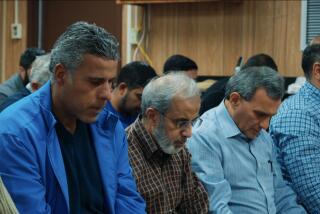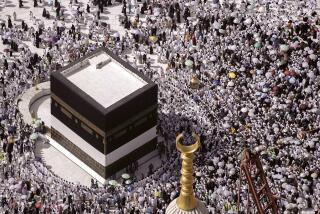London’s Muslim Cops Walk a Beat Bridging Two Worlds
- Share via
LONDON — When Scotland Yard community police officer Saeed Hajjaj detained a young man on theft charges recently, the man told him angrily: “You are a Muslim. You should not be working for the police.”
“You are a Muslim,” Hajjaj said he replied. “You shouldn’t be committing a crime.”
In London these days, it’s often complicated to be a Muslim, often difficult to be a police officer and always tough to be both.
Although some fellow members of the faith are delighted to encounter Hajjaj, a 25-year-old with brown skin who walks his East London beat greeting people in Arabic, others are puzzled about why he would join an overwhelmingly white force with a reputation for racism.
Still others are outright hostile. They view uniformed police officers as the most visible representatives of a government waging wars in Iraq and Afghanistan that have killed many Muslims.
As Europe’s Muslim population rapidly increases -- there are now almost 2 million adherents of Islam in Britain and 15 million in the European Union -- governments are working with various degrees of success and enthusiasm to integrate the newcomers not only into society but also into government.
Muslim and police officials agree about the importance of hiring Muslims for police jobs, which is proving particularly difficult. In their view, having more Muslim officers could help soothe raw relations between majority populations and the largely law-abiding minority and establish better links to communities that have sheltered violent extremists.
The Association of Muslim Police, which supports Muslims on the force, estimates that of Scotland Yard’s 30,000 officers, about 300 -- 1% -- are Muslim, even though almost 10% of Londoners are Muslim.
A Scotland Yard spokeswoman said the force did not keep statistics about its employees’ religions but said it was trying to increase its ethnic diversity because minorities accounted for 7% of officers.
“If something like one in nine Londoners is a Muslim, then I want one in nine police officers to be a Muslim,” Ian Blair, the metropolitan police commissioner, said last summer. “Which means we are currently about 2,000 short.”
Hajjaj, whose photograph is frequently used in ads for Scotland Yard, has wanted to be a police officer since he was 14. Strikingly tall -- over 6 feet 4 -- and born in London to Moroccan parents, he said he viewed policing as a service to his neighborhood, a much-needed way to bridge a cultural chasm. But after 19 months on the job, he said, it has proved tougher than he expected and he is not sure how long he will stay.
The force’s culture has not always been welcoming, Hajjaj said. Like many Muslims, he does not drink alcohol, and he knows that on the force many bonds are forged and promotions sealed in after-hours drinking sessions. And British police stations were not designed with prayer in mind.
So Hajjaj rolls out his green-and-yellow prayer rug in a small space inside a sergeant’s office with glass walls and no privacy. When that is occupied, he uses the locker room.
“I was born here. I love Britain,” he said. Nonetheless, he has had the word “foreigner” tossed at him as a slur -- sometimes from people inside the police station. “Some respect your faith,” he said, declining to elaborate.
Mohammad Mahroof, secretary general of the Assn. of Muslim Police, said many Muslim officers got grief from all sides, including family. A London police officer told him recently that his jaw had been broken by relatives as a warning to get off the force. Mahroof said the officer did not want to be publicly identified and explained that the pressure could be so intense that there were a few “closet” police officers who didn’t even tell their families where they worked.
A uniformed Muslim officer, Mahroof said, was recently roughed up outside the Shadwell mosque by angry young men shouting: “How can you work for these people?” The imam denounced the incident after a visit from Mahroof, a veteran Scotland Yard inspector.
Mahroof, who has a long beard and often wears traditional Islamic dress, said he had caused alarm when entering a local police station and even the headquarters building where he had long worked.
“There has been a full-scale terror alert when I have walked in,” he said, shaking his head.
Frequent street frisking of Muslims after the deadly bombings on the subway and a bus in London last July, which police said were carried out by Muslim extremists, increased the friction between police and Muslim youths in London. In France, angry and alienated young Muslims rioted for three weeks in October and November, torching cars and buildings.
No borough in Britain has a higher percentage of Muslims than the one Hajjaj patrols, Tower Hamlets. Although the 2001 census showed 36% of its population of 200,000 to be Muslim, local officials said the actual proportion is about 50%. Immigrants from Bangladesh, Pakistan, Somalia and other countries -- and their British-born children -- crowd into more and more mosques in a low-income area that once teemed with Jewish seamstresses and Irish dockworkers.
Many older Muslims here either do not speak English or prefer not to. Many rarely leave the densely packed blocks of small apartments where everything from newspapers to rental videos are in Bengali, Sylheti (a language spoken by most Bangladeshis in Britain), Urdu or Arabic. It is a cocoon strikingly separate from nearby Canary Wharf, a neighborhood of gleaming glass high-rises inhabited by millionaire financiers.
“I think I have made a better connection with the community,” said Hajjaj, at ease as he walked into the Shadwell mosque on a recent wintry night. It is a place most of his colleagues have never gone. Hajjaj chatted easily with the imams, standing in his socks on the bright green carpet inside the cavernous mosque, which has grown in its 11 years to serve 2,000 people.
Created in a large space under the docklands railroad line -- the rooms rattle with each train passing overhead -- the mosque is a contrast to the neighborhood’s older Christian churches, which are usually locked and empty. Most evenings, girls and boys as young as 5 file in for Koran lessons. Hajjaj stops in to pray whenever he can.
Earnest and reserved, Hajjaj smiles more than he talks, but he quietly greets virtually everyone he passes. His job is to get to know the neighborhood around the Shadwell train station street by street, face by face, and to help fix any problems along the way. Most of those have to do with jobless youths who gather on the streets, often blasting their music and sometimes selling heroin.
When he first started introducing himself last year, he would say to passersby, “Salaam aleikum,” or “Peace be with you” in Arabic. Some were shocked, he said. “They had never heard that from an officer.”
Walking around the Shadwell train station one recent day on his police rounds, he paused at Watney Market, a busy area with small shops and curbside vendors selling a colorful array of goods such as children’s pajamas and parsnips.
He ducked into Shoe World, where he greeted a young clerk from Bangladesh, Parvin Begum, 26, who was wearing an aqua-colored head scarf. She told Hajjaj she was having no problems but that it was still comforting to see his friendly face.
“He is someone like us,” she said. “We can talk to him more than the others.”
Elsewhere on the market street, Surman Miah, 49, a Bangladeshi, chatted with Hajjaj as he sold bags of small potatoes and red onions from his produce stand. Miah said that sometimes “bad people come and want my money” and that he was grateful for the more-visible foot patrols undertaken by officers such as Hajjaj.
As Hajjaj continued walking around Shadwell, Hassan Ahmed, the 22-year-old son of Bangladeshi immigrants, stopped him and said he was eager to leave his restaurant management work.
“How do you become a police officer?” he asked.
Hajjaj explained the procedure and talked up the job, but later he was more circumspect.
There are rewarding days, he said. Although some officers have caused offense when questioning Muslim women whose faces and bodies are covered, Hajjaj says he knows not to make obvious eye contact with a woman unless she does so first and “not to shake her hand unless she extends it first.” Such basic gestures of courtesy go a long way toward creating goodwill, he said.
But other days are a hassle. “Don’t speak to him. He is not a Muslim,” a husband recently snapped at his wife, who was returning a greeting from Hajjaj.
He says it’s a tiring predicament: Some people can’t get beyond the fact that he is a Muslim, others seem to deny that he is one.
“Before, I really wanted to be a police officer,” he said. “Now I am doubtful. It takes a lot out of you.”
More to Read
Sign up for Essential California
The most important California stories and recommendations in your inbox every morning.
You may occasionally receive promotional content from the Los Angeles Times.










